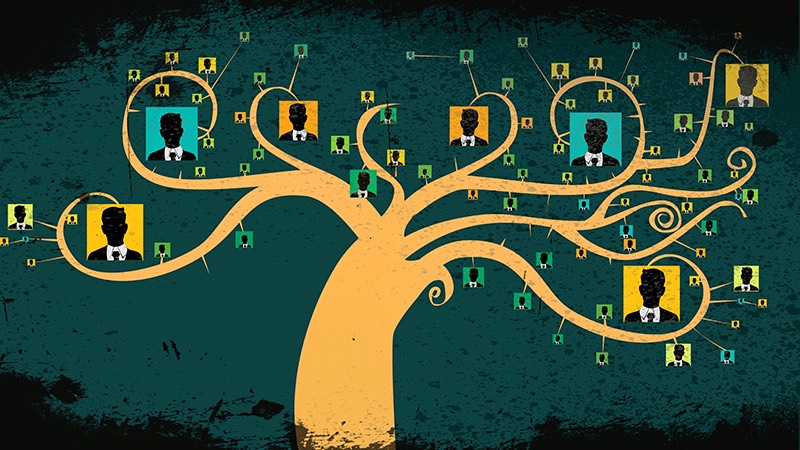
Brand loyalty is somewhat habit-based. Consumers buy products because their parents bought them, passing brand equity from generation to generation. Marketers know this and often leverage that heritage with customers, but in a world where there is disruptive competition for brand loyalty, is heritage marketing still viable?
The answer is yes. While some companies are shelving the heritage value of their brands, others, including Upfield, Ford, Hunter Douglas, Benjamin Moore, and Hormel, are capitalizing on the intergenerational equity of products and brands to retain existing customers and attract new ones.
Bradford Hudson, professor of marketing at Boston College and president of the Brand Heritage Institute in Boston, says companies quick to abandon brand heritage are making a mistake.
“Some companies are afraid to go after the brand loyalty angle lest they be perceived as obsolete,” he says. “Corporate executives are responding to the notion that millennials don’t want old stuff; they want shiny new objects. But it’s really more about creating a hybrid product to make it relevant to consumers.”
Old, historic hotels are a perfect example. According to Hudson, a majority of young people have favorable impressions of historic hotels; they just want modern functionality. Combine rustic charm with updated bathrooms, he asserts, and the clientele will respond to the full experience.
“Convert ‘old’ to ‘historic,'” Hudson says. “You don’t have a new hip brand, but you don’t want to hide from your history either.”
Memorable Moments
Brian Orlando, North American CMO at Upfield, a carve-out of the Unilever food spreads business recently purchased by KKR, believes that drumming up the past can be a powerful mechanism to drive a connection.
“Brands are often living alongside many consumer emotional moments,” Orlando says. “They may not necessarily be part of the family but they are certainly present in those memorable moments.”
Upfield’s strategy is designed to remind consumers of the taste profile of its products. People get used to a certain taste and don’t necessarily like change. Yet, as consumers stroll the aisle of their local grocery store, for example, they can see numerous disruptive brands have entered the marketplace, including private label or less expensive brands. That’s when it’s important for heritage brands to “remind consumers about the most important thing — the taste — and that the brand will never let them down,” Orlando says.
Country Crock and I Can’t Believe It’s Not Butter! are two Upfield product lines that depend on consistency, but different brand attributes, to connect with customers.
“There has always been an element of humor in the world of ‘Can’t Believe,’ in a relatively reserved category,” Orlando says of the buttery spread. “We push the envelope and are quite rebellious, which helps us stand out and connect with the high-flavor taste profile.
“Country Crock has always been about family and naturalness,” he continues. “When we talk about loyalty and heritage, being consistent about the brand identity is key. If that consistency is absent, it’s like meeting a stranger, not like someone we know.”
Connecting to memorable moments through taste, or how the product was originally made, make for a great story. Unilever’s Hellmann’s brand mayonnaise is the perfect example of this. With a recipe of simple ingredients — eggs, oil, and vinegar — Hellmann’s remains true to its origins of more than 100 years ago, when life was simpler. Conjuring a feeling of naturalness and the brand’s origin story for fresh, simple ingredients helps build an emotional bond with consumers.
“Anniversaries are celebratory moments. If you go back and explore the history of the brand, you discover so many interesting facts,” Orlando says. “With Hellmann’s, we found the product was originally called Blue Ribbon Mayonnaise, which is on the jar. These anniversaries force the brand teams to go back and find these golden nuggets that are meaningful for the consumer.”
Modernizing Heritage
While customers may relish the comfort of brand heritage, they can simultaneously look for a more updated brand that fits today’s lifestyle. Hunter Douglas, manufacturer of shades and blinds for nearly a century, decided to refine its brand position, despite inherited brand equity for quality.
Although focus groups recalled the quality of Hunter Douglas shades and appreciated their durability over time, the younger generation of buyers valued something different.
“Buyers in their 30s are choosing beautiful homes and want quality products,” says Vic Carlson, CMO at Hunter Douglas. “But younger generations are not so much about a gratuitous expression of wealth; they are more about experiences and real value. It’s a different mindset to be purchasing for the long run.”
Though Carlson acknowledges a “fantastic halo effect” from a quality brand equity, he cautions against over-reliance on brand heritage. Nostalgia and trust may support a purchase, but they may not be enough at a higher price point. “Tradition and pass-down equity are a great foundation,” he says, “but in the industry we compete in, we can’t just rely on that. The perception of real innovation — smart automation — matters. It cannot just be a re-skin of an existing product.”
To that end, Hunter Douglas relaunched its Powerview smart shades, which completely changed the main thrust of its conversations with consumers. Using a web-based app, the new shades can be raised and lowered on timers set to match the homeowners’ schedules, for instance, or even a specific day or time. Battery operation means no drilling or expensive electrical work is required.
Hunter Douglas has not abandoned its quality, durability, designs, and aesthetics. To counter a feeling among some consumers that they don’t need these shades, modernizing the brand helps. “When we expose our motorized products, their eyes light up,” Carlson says.
Hormel Foods brand Skippy peanut butter has also stayed true to its brand essence, while updating its offerings for today’s consumer. The brand recently married a product truth in its “Be Smooth Like Skippy” campaign with a pop culture reference from the Bruno Mars hit “Uptown Funk.”
According to Jennifer Nolander, marketing director for grocery products at Hormel Foods, meeting evolving consumer needs is paramount. She points to the introduction of the Skippy PB Bites line as a snack option, which won IRI pacesetter and GMA awards for creativity and innovation.
“We provide consumers with an on-the-go true peanut butter experience,” Nolander says of the portable Skippy snack. “As long as we stay true to the essence of our brand in everything we do, we find it relatively easy to connect our brand heritage to our strategy. Our campaign extends into the social space, and we work to ensure that connection throughout all of our marketing tactics.”
Change and Continuity
Benjamin Moore is proud of its brand heritage, with CMO Barry Toubin noting it has made it possible for the paint company to develop deep-rooted and trust-based relationships with painting professionals and consumers. ABC News featured the paint brand in May in a “Made in America” segment because it has covered Fenway Park’s famed Green Monster wall for decades.
But with buyer behavior constantly changing, it is not an easy feat for heritage-reliant brands to be seen as relevant and relatable. Such brands must be adaptable, without losing their reputation in doing so.
“Our tactical approaches have changed over the years, but the meaning behind them has always stayed the same,” Toubin says. “The Benjamin Moore vision ‘to revolutionize how the world thinks about paint’ has always been at the core of what we do, whether it’s utilizing new digital media strategies or building creative campaigns to engage with our customers.”
Benjamin Moore inspires brand loyalty with compelling, inspirational, and engaging content that reflects core values and creates emotional connections with buyers. “People who choose our products know they’ll get the inspiration and support to make their vision reality,” Toubin says. “Their trust defines Benjamin Moore. The multigenerational use of our product is something in which we take a great amount of pride.”
Upward Mobility
At Ford, there is great respect for brand heritage, but there is also a strong push to focus on customer experience. As a long-standing brand that carries a tremendous positive equity, Ford is leveraging its heritage to move forward.
“As the automotive industry is undergoing significant transformation, the strength of our brand may be more important now than it ever has been,” says Brad McCalister, marketing manager at Ford. “As we transform into the world’s most trusted mobility company, it will be critical for us to continue to deliver products, services, and experiences that customers want and value.”
The company is focused on designing human-centered mobility that adds value to people’s lives, McCalister says. “Optimism, strength, and helping people make progress in their lives are how we promote our brand,” he says. “This is in our core belief that ‘freedom of movement drives human progress.'”
Ford’s aspiration to become the world’s most-trusted mobility company leverages its heritage. “That will be a key accelerant for this aspiration,” McCalister says.
New Platforms, New Opportunities
Social media and influencer digital marketing provide heritage brands with a new, engaging platform to reach and expand their audience, millennials in particular. Benjamin Moore’s Toubin believes that the relationship between heritage brand loyalty and social media/influencers is extremely symbiotic — if the relationship is authentic. While brands gain access to new audiences, they simultaneously provide trusted content for influencers that inspire their target audiences and enable them to elevate their brand position.
“This type of content marketing, where real people advocate for brands, can be a highly effective engagement method,” Toubin says. “Authenticity is the common denominator. Certain tools and strategies are not always a fit for every brand and can be viewed as disingenuous. We connect the dots by deciphering what truly works for the brand to ensure that everything we do is genuine.”
Vic Carlson at Hunter Douglas believes that more than ever, folks are relying on people they trust for purchase recommendations. It’s one way brand habits are formed. “Preferences from parents and friends fit in perfectly with social media influencers,” he says. “Hunter Douglas sees this as the fast track to meaningful connections.”
A Fan for Life
For popular New York morning radio personality Jim Kerr of iHeart Radio’s Q104.3, brand loyalty is a two-way street.
“A brand has to be loyal to the customer,” Kerr says. “There is nothing worse than a brand not meeting your expectations. If the brand disappoints, it’s like someone cheating on you in a relationship.”
Kerr, who has long professed his passion for original Kraft Macaroni and Cheese, says that his devotion to the brand goes beyond his childhood experience.
“I was introduced to Kraft Macaroni and Cheese as a kid by my mom,” Kerr remembers. “She would serve it as a side dish at lunch time and I would look forward to it. I’d had home-baked mac and cheese but there was something distinct about the flavor and texture of this product that made me love it.”
The signature Kraft brand was a staple in Kerr’s pantry as a young disk jockey in Ann Arbor, Mich.
“I used to binge on the mac and cheese,” Kerr recalls. “It was inexpensive and I loved it. I could go to the supermarket and it was something that I could afford and know that I’d always enjoy. “
Kerr remains a super fan, even though he can afford to splurge on a more artisanal version of the dish.
“I walk into the supermarket, I see the logo and it gives me a sense of trust,” he says. “And I can smell and taste the product. I still eat this a few times a month.”
Kerr emphasizes the importance of customer loyalty from the brand.
“There are all kinds of consumer goods on the market and constant innovation. There is always something new going on and many opportunities for us to make choices,” he notes. “We are, throughout our lives, open to new brands, but a brand that can really capture us and satisfy a need, can keep us as customers forever.”
Has Kerr’s undying loyalty for Kraft Macaroni and Cheese been passed down to his family?
“My son grew up loving it,” he says, “and now his son and daughter love it too.”
— A.D.

